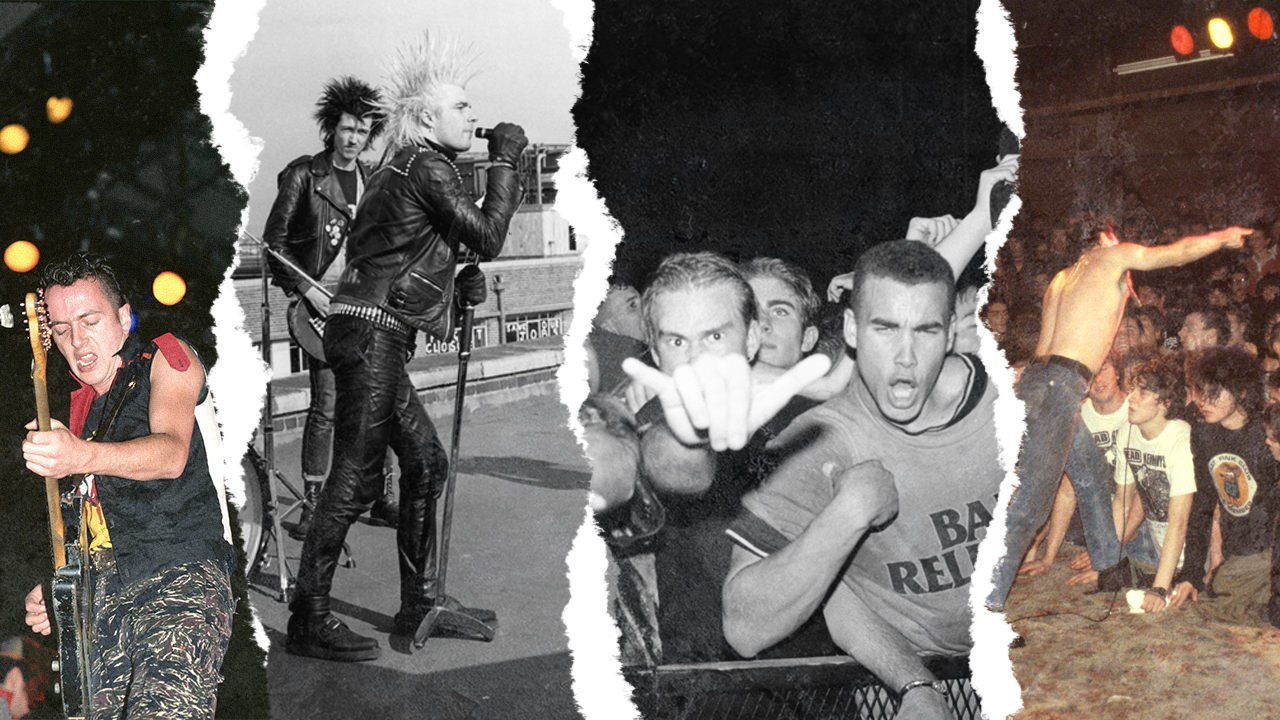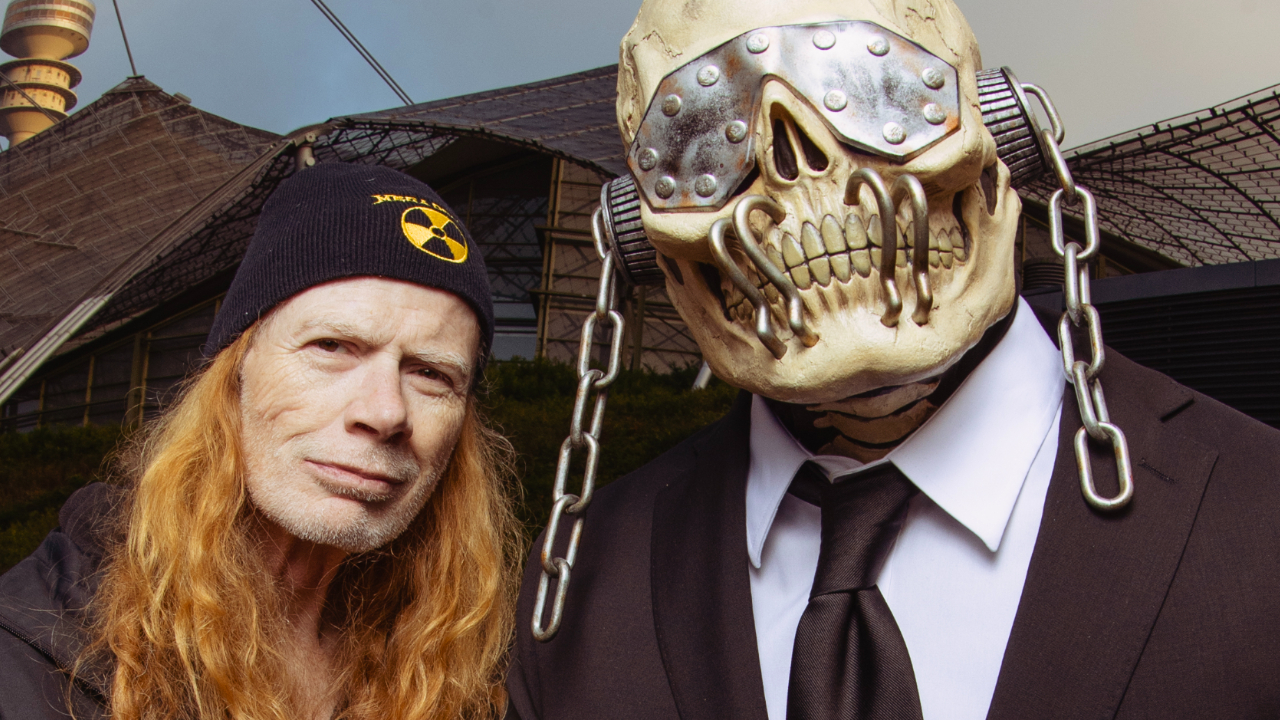12 albums that prove 1982 was punk's greatest year
Punk might have been more popular in '77, but the class of 1982 changed the landscape of music forever

Select the newsletters you’d like to receive. Then, add your email to sign up.
You are now subscribed
Your newsletter sign-up was successful
Want to add more newsletters?

Every Friday
Louder
Louder’s weekly newsletter is jam-packed with the team’s personal highlights from the last seven days, including features, breaking news, reviews and tons of juicy exclusives from the world of alternative music.

Every Friday
Classic Rock
The Classic Rock newsletter is an essential read for the discerning rock fan. Every week we bring you the news, reviews and the very best features and interviews from our extensive archive. Written by rock fans for rock fans.

Every Friday
Metal Hammer
For the last four decades Metal Hammer has been the world’s greatest metal magazine. Created by metalheads for metalheads, ‘Hammer takes you behind the scenes, closer to the action, and nearer to the bands that you love the most.

Every Friday
Prog
The Prog newsletter brings you the very best of Prog Magazine and our website, every Friday. We'll deliver you the very latest news from the Prog universe, informative features and archive material from Prog’s impressive vault.
Anecdotally speaking, 1977 is usually accepted as ground zero for punk rock. It was the year the genre truly exploded as it achieved mainstream notoriety and the likes of The Clash, Sex Pistols and The Damned each released their debut albums, kickstarting a youth movement that saw bands burst into life just about anywhere there were kids to form them. Conversely, by 1980 the genre had been declared dead; the media had moved on, the genres of post-punk and new wave had mutated away from its source DNA and its biggest champions had either split or were said to be past their creative peak.
Except, that doesn't really account for what happened after 1980. Punk might have lost its mainstream spotlight, but the genre had gone to ground, getting a whole lot faster, angrier and more political as a new wave of punk artists arose to make the scene their own and coin a whole new school for the genre: hardcore. Where new wave co-opted punk's commercial appeal, hardcore punk went in completely the opposite direction, a whirlwind of furious nihilism that in turn also helped inspire heavy metal to go a whole lot heavier and spawn the likes of thrash, black and death metal in the process.
So never mind the bollocks about punk being dead: these 12 albums show 1982 just may have been the most crucial year in punk history.

1. The Exploited - Troops Of Tomorrow
The Exploited's debut album was titled Punks Not Dead, and that tells you just about everything you need to know about the Scottish punks' stance on the state of punk rock. Though not as sonically furious nor as political as they would later become (1983's Let's Start A War... Said Maggie One Day offered the tipping point into outright hardcore punk), Troops Of Tomorrow represented a shift in The Exploited's sound, vocalist Wattie Buchan snarling like a bulldog on songs like U.S.A. that were almost proto-thrash in nature. This wasn't a coincidence – The Exploited were a key influence on early extreme metal, their songs going on to be covered by the likes of Slayer, Hypocrisy and Impaled Nazarene, while the song UK82 gave a name to the new generation of punks kicking up a storm in the early 80s.
2. Anti-Nowhere League - We Are... The League
70s punks may have caused outrage and courted controversy, but the Anti-Nowhere League made them look like choirboys. Greasy rock'n'roll outlaws who had more in common with Motorhead than The Ramones, the band's 1982 debut album We Are... The League is an affront to all that is decent in the world. Bad taste vulgarity helped make So What one of punk's most notorious songs (and a favourite of Metallica in the process), but the entirety of We Are... is an exercise in sneering excess, playing the role of villains to perfection as they took the Oi! baton from the likes of Sham 69 and took it to its logical conclusion.
3. Bad Brains - Bad Brains
Washington DC's Bad Brains were a force of nature right from their inception, a galvanising entity whose live shows in turn inspired greatness from fellow hardcore legends including Minor Threat and Black Flag. Their influence crossed genre lines and covered everyone from Living Colour and Anthrax right up to Fever333, Clutch and Death Grips, while the band could be found playing alongside any number of hardcore punk or thrash legends throughout the 80s. Faster than just about any other band on the planet, the band were as likely to tear the walls down on songs like Pay To Cum or Banned In DC (a song about their live shows causing them to be blacklisted from playing in their home town) as they were to break into a reggae/dub jam. Their self-titled debut is still utterly iconic today.
4. Discharge - Hear Nothing See Nothing Say Nothing
Discharge's full-length debut album Hear Nothing See Nothing Say Nothing genuinely changed the shape of both metal and punk forever. Giving form to D-beat and crust whilst kickstarting the 'dis-core' movement (bands who used the 'dis' suffix in their name – Discharge, Disfear, Disgust etc.), Discharge's furious brand of British hardcore punk heavily influenced the subsequent extreme metal explosion and saw them covered by everyone from Machine Head and Metallica to Napalm Death and Arch Enemy. Fiercely political, Hear Nothing See Nothing Say Nothing is utterly apoplectic, directing its ire at both the failings of the 80s UK Conservative government and threat of nuclear annihilation, waving its flag proudly and paving the way for more politically-minded aggro for decades to come.
Sign up below to get the latest from Metal Hammer, plus exclusive special offers, direct to your inbox!
5. GBH - City Baby Attacked By Rats
Birmingham may have been the birthplace of Black Sabbath and Judas Priest, but by the 80s the city was host to a wide range of scenes. While the new romantics were inspiring fashion from city centre nightclubs like The Blitz, out on the outskirts of town in areas like Moseley, venues like Barbarellas The Mermaid became the favoured breeding ground for punk. Chief of the scene were GBH (originally Charged GBH), the hardcore punks who would go on to help shape extreme metal by inspiring everyone from Slayer and Metallica to Bathory and Destruction. GBH's debut album City Baby Attacked By Rats is almost akin to the missing link between '77 punk rock and hardcore, an evolutionary leap that saw the songs go much harder and faster than anything that had come before whilst keeping the overall punk framework.
6. Vice Squad - Stand Strong Stand Proud
Directly influenced by bands like X-Ray Spex, Bristol's Vice Squad didn't buy into the heavier direction punk was taking, instead resolutely following the spirit of '77 as far as it would take them. Vice Squad's 1982 album Stand Strong Stand Proud was the last in their original incarnation, with vocalist Beki Bondage leaving the band the following year to form other groups. Nevertheless there is a vitality to the release that bristles with the same energy that influenced the original wave of '77 punks, maintaining just enough pop sensibility to ensure the songs had radio appeal. The single Out Of Reach became the only Vice Squad single to ever break the top 100 of the UK singles charts.
7. Descendents - Milo Goes To College
Though the 80s saw punk get heavier and faster via hardcore, the foundations were also being laid for the polar opposite: pop-punk. Orange County residents Agent Orange and Adolescents established the basic shape of pop-punk with their 1981 debut albums, but it was the Descendents' Milo Goes To College that gave it bite. Offering a more melodic take on hardcore punk, Milo... established the lyrical bedrock that was key to pop-punk in the mid-90s and early 2000s: heartbreak, rejection, suburban boredom and teenage angst, not to mention a regrettable amount of since-disavowed misogyny and homophobia which would make this album hard to love if it was released today. Still, it's hard to imagine the what the shape of pop-punk to come might have been without Descendents' influence.
8. M.D.C. - Millions Of Dead Cops
With an album title like Millions Of Dead Cops and lines like 'No war, no KKK, no fascist USA', Texas' M.D.C. nailed their colours right to the mast on their debut full-length album. A blitzkrieg of full-speed, highly politicised aggro hardcore punk, Millions Of Dead Cops is anti-fascist, anti-racist, anti-homophobe and anti- just about every other prejudice you could come up with, utterly unambiguous in its message with songs like John Wayne Was A Nazi. Nirvana frontman Kurt Cobain listed the album as one of his all-time favourites, M.D.C. proving to be leading lights in socially-conscious punk.
9. Dead Kennedys - Plastic Surgery Disasters
Dead Kennedys' debut album Fresh Fruit For Rotten Vegetables is nothing short of an all-time punk classic, its sardonic humour and frantic outbursts of energy helping establish the Dead Kennedys as scene leaders in US punk. For their 1982 follow-up Plastic Surgery Disasters, the band were taking things in much more experimental directions. Songs like Forest Fire and Nazi Punks Fuck Off skewed decidedly in favour of hardcore punk, but were set against eccentric outbursts like Forest Fire and Trust Your Mechanic, while the swinging grooves of songs like Halloween came on like the Dead Kennedys' warped version of psychobilly, laying seeds for weirdo punks like Butthole Surfers and Cows in future. The album reached no. 2 on the UK indie chart and confirmed that Dead Kennedys were among the most creative bands to ever emerge from punk rock, experimenting with their sound to ensure they never got left behind.
10. Flipper - Generic Flipper
Flipper's debut album Generic Flipper is an endurance test in pure punishing heft, the band taking the idea of punk as being a poorly-played racket to its logical conclusion. Except, Flipper could play – their mastery of noise was second to none, opener Ever lumbering with all the grace of a drunken elephant in a china shop, utterly calamitous to behold and yet absolutely thrilling for the fact. While everyone else in punk was speeding up, Flipper were slowing right down (long before Black Flag had the same idea), creating something that sounds like the bastard son of punk and doom metal, helping give birth to noise rock and grunge in the process.
11. Misfits - Walk Among Us
The Misfits' debut album Walk Among Us was definitive proof that punk wasn't dead – if anything, it was undead. Horror punk originators from New Jersey, The Misfits took the pacier tempos of hardcore whilst keeping the massive choruses of punk's first wave, Glenn Danzig's gothic baritone lending the band's sound a distinctive tone and gravitas. While heavy metal had flirted with horror in its first decade, the Misfits were sneaking up to its bedroom window and professing their undying love, melding the two together in ways that wouldn't be matched until thrash took their lead later in the decade.
12. Fear - The Record
LA punks Fear had been around for five years by the time they released their debut album The Record, but that didn't mean they felt any need to mature. Obnoxious as they come, The Record was more about offending and warping expectations than it was about expressing a worldview, songs like Let's Have A War and New York's Alright (If You Like Saxophones) dripping in the same brand of sarcastic humour so beloved of Dead Kennedys frontman Jello Biafra. Vocalist Lee Ving had the requisite bark needed for hardcore punk, but also delighted in offering a twisted version of Elvis-style crooning, a trick repeated at the end of the decade by Faith No More's Mike Patton (who also later collaborated with Ving on a cover of I Don't Care About You).
News editor for Metal Hammer, Rich has never met a feature he didn't fancy, which is just as well when it comes to covering everything rock, punk and metal for both print and online. He's as happy digging up new bands from around the world and covering scenes in countries like Morocco and Estonia as he is covering world-conquering acts like Sleep Token, Black Sabbath and Deftones.

